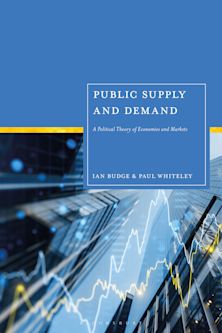- Home
- ACADEMIC
- Economics
- History and Theory of Economics
- An Economic History of the United States
An Economic History of the United States
Conquest, Conflict, and Struggles for Equality
- Textbook
An Economic History of the United States
Conquest, Conflict, and Struggles for Equality
- Textbook
This product is usually dispatched within 1 week
- Delivery and returns info
-
Free CA delivery on orders $40 or over
You must sign in to add this item to your wishlist. Please sign in or create an account
Description
The economy of the United States is constantly evolving in response to wars, technological innovations, cultural revolutions, and political maneuverings. Tracing the economic machine of the United States from its first experiments in the colonies to the post–Great Recession era of today, Frederick S. Weaver creates a dynamic narrative of this country’s progression through times of feast and times of famine. Weaver explores diverse areas of the market beyond the financial sector, examining historical fluctuations in distribution of income, how the ebb and flow of specific industries have influenced the shape of the market, and, ultimately, how the economy of the United States has made America the nation we know today. An Economic History of the United States is a thoughtful and accessible introduction to the subject of American economic history, suitable for undergraduate courses in U.S. political and economic history.
Table of Contents
Introduction: Some Initial Definitions and Organizational Strategies
Part I: Colonial Roots
Chapter 1: Mercantilism, British Colonialism, and Independence
Part II: The New Nation: From Revolution to Civil War
Chapter 2: Defining the New Nation
Chapter 3: Regions, Sections, and Civil War
Part III: Fifty Years after the Civil War
Chapter 4: Wartime Legislation, Western Expansion, and Reconstruction
Chapter 5: Changing Forms of Industrial Development
Chapter 6: Social Change, Politics, and Reform
Chapter 7: The United States in the World
Part IV: Into the Twentieth and Twenty-First Centuries
Chapter 8: War, Depression, War
Chapter 9: Post-World War II Recovery, Institutional Innovation,
Chapter 10: The Demise of the Bretton Woods System and the Dissolution of U.S. Modern Times, 1980
Chapter 11: The Great Recession, Austerity, and Three Worrisome Tendencies
Glossary
Bibliography
Product details
| Published | Nov 12 2015 |
|---|---|
| Format | Hardback |
| Edition | 1st |
| Extent | 302 |
| ISBN | 9781442255197 |
| Imprint | Rowman & Littlefield Publishers |
| Illustrations | 24 Tables, 2 Textboxes |
| Dimensions | 238 x 158 mm |
| Publisher | Bloomsbury Publishing |
About the contributors
Reviews
-
‘Standard’ approaches to the history of the U.S. economy (e.g., Gary Walton and Hugh Rockoff; Jonathan Hughes and Louis Cain) take a narrative approach, bolstered with the use of neoclassical microeconomic or Keynesian macroeconomic analyses of specific issues (e.g., the economics of slavery; the causes and consequences of economic “panics”). Weaver takes a different path, developing a ‘political economy’ approach based on an understanding of capitalism as a conflict between workers and owners, with an emphasis on manufacturing (and a secondary emphasis on America’s role in the global economy). In doing this, he clearly differentiates his book from other textbooks in the field. . . . Another point of differentiation is that Weaver devotes a third of the book to post–WW II developments, far more than other texts. This is an interesting book, but for most teachers of U.S. economic history it will require a major rethinking of the structure and content of their courses. Summing Up: Recommended. Academic audiences: lower-division undergraduates and up; general readers.
Choice Reviews
-
A fascinating account of the American economic story.
Simon Johnson, professor, MIT Sloan School of Management, and faculty co-director of the MIT Shaping the Future of Work Initiative
-
Fred Weaver’s An Economic History of the United States is an unfailingly engaging, succinct, and insightful analysis into the economic forces that have shaped the lives of those who have populated our nation, from its Mercantilist beginnings in the colonial period to the unraveling of the U.S. economy during the Great Recession of the last decade. Weaver digs deep to unearth the mélange of conflicts between labor and capital, among competing capitalists, and between public policy and private interests that underlie the history of a U.S. economy embedded in and constrained by a global economy. At the same time, he breathes life into the day-to-day manifestations of those conflicts in the struggles between South and North, over industrialization and immigration, and in today’s economy bedeviled by persistent stagnation and ever worsening inequality.
John Miller, professor, Wheaton College



































